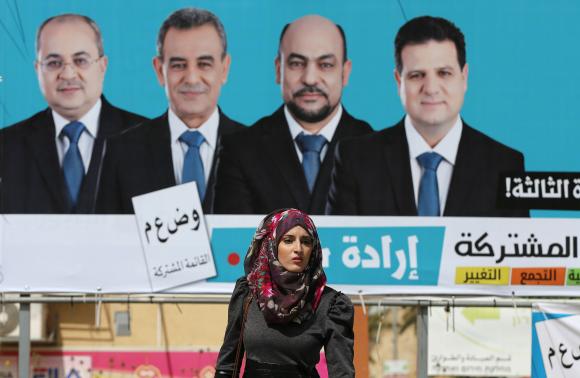
“This is the first time that Arab movements and blocs unite in a unified list to run in the elections of the Israeli Knesset and it is a precious opportunity to immunize the Arab community.” The Druze leader was quoted as saying on Thursday.
The Joint Arab List has changed Arab Israeli perceptions of their opportunities in Israeli politics. While some on the right-wing might not be thrilled with the challenge the slate could be in the Knesset, it is also a sign that Israeli Arabs have finally decided to participate in Israeli democracy.
Israel’s Arab minority is hoping to gain much-needed muscle in the upcoming parliamentary election, with four Arab parties uniting under one banner for the first time.
Surveys show the Joint Arab List could even finish third in the vote and become a factor in the coalition-building that dominates Israeli politics, where no party has ever won a parliament majority.
Many in the Arab community, which makes up 20 percent of Israel’s eight million population, see the newfound unity as a breakthrough in battling discrimination and gaining recognition. Though they have full and equal rights, Arab Israelis often say they are treated as second-class citizens.
“We’ve been waiting for this for decades,” said Mirna Baransi, 24, a student from Nazareth. “We’ll have more power now to make a difference.”
The Arab parties have traditionally won around 11 seats in the 120-seat Knesset. As a joint list, opinion polls predict, they could win 13, while their internal projections suggest this could even rise to 15, putting the group a clear third.
In Israel’s parliamentary election system, voters choose parties rather than individual candidates, and the head of the party with the most political allies will usually win a presidential mandate to try to form a government.
Ayman Odeh, head of the Joint Arab List, has hinted that the faction may back Isaac Herzog, whose center-left Zionist Union is running neck-in-neck with Prime Minister Benjamin Netanyahu’s right-wing Likud before the March 17 vote.
Druze & Christians are not excited about the elections
The wars in Syria and Iraq are reinforcing Druze and Arab Christian identity in Israel, according to a post by Dr. Radai on the Moshe Dayan Center’s website, Israel National News reported on Thursday
“The collapse of the Syrian and Iraqi nation states has further strengthened the Palestinian nationalist sentiment among Israel’s Muslim Arabs. Concurrently, communal-sectarian identities among Israel’s Christians and Druze have been reinforced, resulting in increased inter-communal friction with Israel’s Muslims.”
Christians and Druze are reportedly less likely to vote next week than Muslims according to another poll by the Yaffa Research Institute.
“For the Druze it’s probably for many reasons,” says Dr. Radai. “There could be a lack of general interest. It could be there’s no Druze list in the campaign. Another reason might be frustration among a population who feel as being mistreated by the Israeli government . Several of the police officers injured or killed in recent Jerusalem terror attacks have been from the Druze community.
On Christians, Radai saw them as “in between Druze and Muslims. Most don’t serve in the IDF but some do go in voluntarily.”
As to why they seem be more likely than the Druze but less likely than Muslims to vote next week, Radai could not help but consider the tribulations of Christians in other Middle Eastern countries.
“It might be due to changes that are transforming the community in Israel in conjunction with changes going on throughout the region. The civil war in Syria and the ISIS war in Iraq are also influencing Christians here.”
Radai added that these two minorities within the greater Arab minority are being socially pulled in multiple directions.
“There might also be some embarrassment or confusion which leads to a lower percentage of voters. They are torn. Many see themselves as Arabs, but recent changes (in the Middle East) are making Christians feel much less inclined to identify as Arabs or Palestinians (in Israel). There is no Christian party running for the Knesset, but there are candidates on the (Arab) Joint List. The relatively lower percentage might be due to this confusion.”

Leave a Reply
You must be logged in to post a comment.